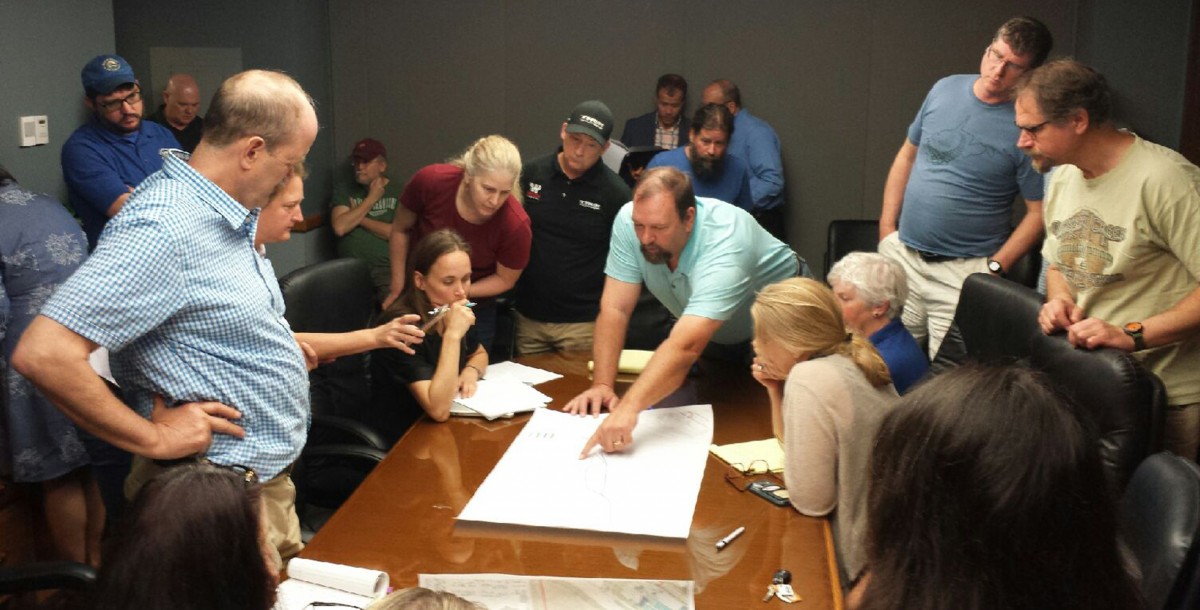MORGANTOWN — The office in charge of environmental remediation with the West Virginia Department of Environmental Protection has given the Morgantown Utility Board the green light to proceed with a raw water pipeline through White Park.
This after a 300-plus page Phase II Environmental Site Assessment of MUB’s proposed route through the park was completed by Triad Engineering and made public Friday.
In essence, the report says there are contaminants in the soil, but that didn’t come as a surprise. The area was part of a 700-acre crude oil tank farm operated by Standard Oil and its subsidiaries from the late 1800s to the early 1960s. Triad released similar findings when it conducted an assessment of park soil for the DEP in 2009.
However, both Triad and the DEP are in agreement that if an appropriate soil management plan is implemented “there will be no unacceptable risk to human health or the environment.”
MUB Spokesman Chris Dale said the report was pretty much in line with what MUB was expecting. He said that while the soil management plan is still being finalized, the utility isn’t expecting “any extraordinary measures to be required.”
“Removal of the affected soil and proper disposal in a landfill is most likely to be presented,” Dale explained. “That would be consistent with the recommendation in the Assessment Report.”
Waiting for Triad’s environmental report cooled what became a hot-button issue in late April, when markings appeared on a number of trees — many of them 100-plus-year-old “witness” trees — along the park’s walking path. The marks indicated MUB’s initial route for the 30-inch-diameter water line from the new George B. Flegal Dam and Reservoir — which is currently under construction — to the utility’s treatment facility on Don Knotts Boulevard.
Faced with a substantial public outcry, MUB immediately abandoned that original route, conceded it had failed to properly inform the public of the need to run the gravity-fed pipeline through the park and conducted a series of public feedback sessions.
MUB said the lack of communication stemmed from the utility’s mistaken belief that it still owned the park property, which contains the original Cobun Creek Reservoir.
The public sessions ultimately resulted in the identification of two prospective routes through the park on the Green Bag Road side, south of the existing Cobun Creek reservoir. The soil along those routes, which are nearly identical, is what was tested by Triad.
MUB has said it will need to cut a 40-foot swath through the park to place the pipe and will leave behind a 10- to 15-foot-wide trail. It will also replant the impacted area with assistance from the Morgantown Tree Board.
JoNell Strough, chair of the Mon Valley Green Space Coalition, said she doesn’t see how confirmation that the soil is contaminated with poisons like arsenic is positive news for a prospective water line route.
“To me, that’s not good news. And, of course, the soil contaminants are just one concern — and as the report has shown, a valid concern,” Strough said. “But we’re also concerned with the loss of 2.5 acres of wooded area in a public park, which is habitat for birds and wildlife.”
Strough and the Coalition have been outspoken in their belief MUB should exclude the park entirely. MUB has said in order for the pipeline to be gravity-fed, thereby eliminating the need for an expensive pumping station, the potential routes are limited and they all run through White Park.
Strough said the Coalition supports the need for the secondary water source and appreciates MUB’s willingness to put this process on hold, but not its insistence on disturbing White Park.
“The coalition will continue to discuss this as more information becomes available, but I don’t think anything in the report changes our position,” Strough said. “This whole thing was started because MUB thought they could just go through the park. They thought they owned it, so all this other stuff that’s come up doesn’t really change the fact that they shouldn’t have planned to go through the park in the first place because they don’t control the park. They need to find another route.”
Dale said the findings in the report will be discussed at Wednesday’s 3 p.m. BOPARC meeting at the Wiles Hill Community Building. On Aug. 19, the report will be presented to the MUB board of directors, which will discuss how to proceed.
MUB General Manager Tim Ball has previously said that construction on the pipeline likely won’t begin until at least Thanksgiving after D&M Contracting ended up having to pull off the job when work was delayed.
Due to the unplanned stoppage, MUB will pay the contractor a $12,000 remobilization fee and is paying $3,000 monthly to store the pipe sections.
Tweet @DominionPostWV.




